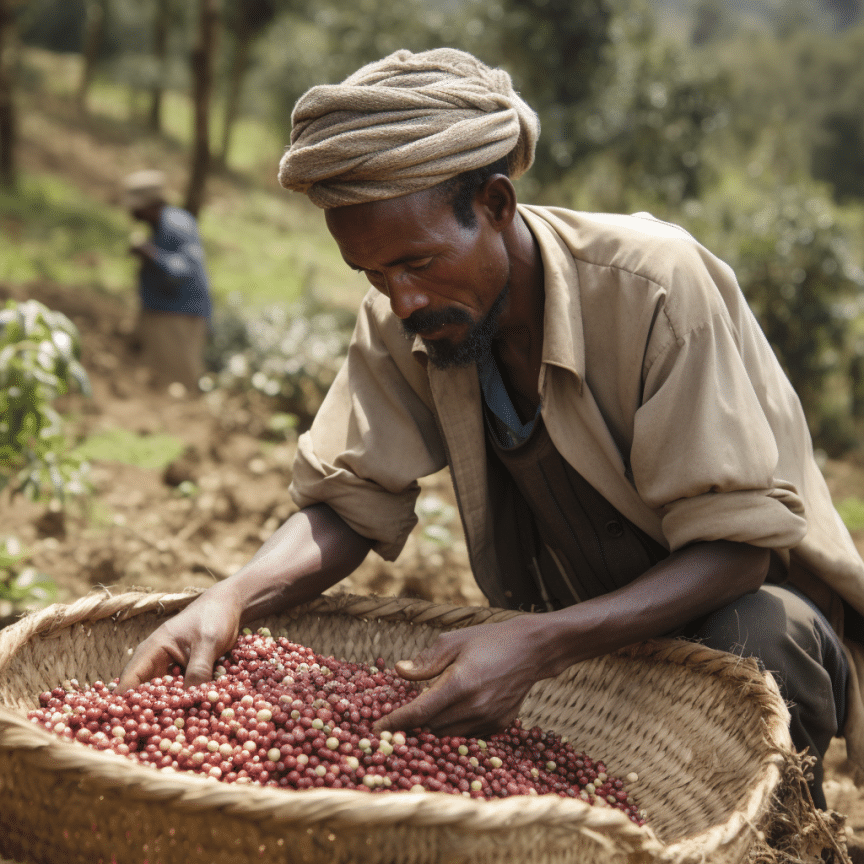
Experience the rich flavors of Gotae Sodu Hambela FW Organic, a fully washed and organic coffee variety cultivated in the pristine forests of Guji. The semi-wild nature of these trees gives rise to unique and exclusive coffee varieties that cannot be found anywhere else. This extraordinary genetic diversity leads to unparalleled taste experiences in this exceptional coffee and others grown under similar forested conditions.
Exploring Gotae Sodu Coffee
A Haven for Flavorful Delights At the renowned Gotae Sodu washing station, smallholder farmers from the surrounding dense protected forests deliver their cherry coffee. Acting as dedicated stewards of the wild coffee thriving in the area, these farmers work harmoniously with the government to ensure minimal human intervention. Owned and operated by Abebe Mulugeta Kassa Genet, the Gotae Sodu washing station upholds a commitment to preserving the natural essence of the forest.
Cultivating the Extraordinary
The semi-wild coffee trees in this region possess unique varieties that are exclusive to the forested environment. Remarkably, the flavors produced by these trees can vary significantly from one section of the forest to another. This exceptional genetic diversity creates a symphony of flavors in every cup of Gotae Sodu Hambela FW Organic, setting it apart from other coffees grown in similar forested conditions.
From Harvest to Post-Harvest Care
Red cherry coffee beans are meticulously handpicked by smallholders and transported to the Gotae Sodu washing station. Upon arrival, the cherries undergo a careful process, beginning with pulping in a drum pulper and fermentation in water for 24 to 60 hours. Following fermentation, the coffee is thoroughly washed with clean water and graded in concrete canals. The parchment then undergoes a soaking process in clean water for 5 hours before being placed on raised beds for sun drying. Throughout the drying period, the parchment is regularly raked to ensure uniform moisture removal. It takes approximately 12 days for the parchment to dry thoroughly. Afterward, it is stored in a warehouse for 1 to 3 months to achieve optimal flavor before being milled and prepared for export at a mill in Addis Ababa.
Unveiling the Guji Region
Characterized by steep mountainous terrain and abundant rainfall, the Guji region provides ideal conditions for the cultivation of diverse coffee varieties. While Guji coffee has only recently been recognized as distinct from neighboring Sidamo and Yirgacheffe, its exceptional quality and unique profiles have rapidly gained international acclaim.
Ethiopia Grade 1 Excellence
In Ethiopia, coffee grading relies on visual inspections for defects and cup quality evaluations. Grade 1 is synonymous with the highest-quality coffee, while grades 2 to 9 are categorized as commercial coffee. Specialty coffee encompasses grades 1 and 2, known for their exquisite flavors and absence of cup faults and quakers.
Discovering Sibu Coffee Producers and Exporters
Sibu Coffee Producers and Exporters take pride in their vertically integrated operations. They source cherry from their own farm, as well as from farmers delivering to their three washing stations. Furthermore, farmers, washing stations, or collectors sell dried coffee to Sibu. With each washing station providing employment for 20 permanent employees and 180 seasonal workers, Sibu Coffee Producers and Exporters maintain a strong commitment to supporting the local community.
Ethiopia’s Coffee Legacy Ethiopia, known as the birthplace of coffee, continues to captivate the specialty coffee industry with its unparalleled variety of flavors. While complete traceability has posed challenges in the past, new regulations have facilitated direct purchasing, allowing us to partner directly with farmers.
